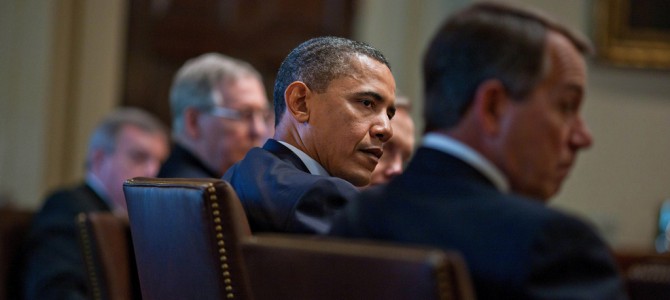
Although it may be difficult to imagine, there are things more devastating to a country than a few years of legislative gridlock. For example, allowing slavish partisanship to corrode principles of American governance for temporary political gain. That sort of thing.
Is this an overreaction? Well, this week, the Senate Majority Leader of the United States sent a letter to the president, urging him to unilaterally change the legal status of millions of people. Since “Republicans have not acted,” Harry Reid and other top Democrats reasoned, “we fully support your decision to use your well-established executive authority to improve as much of the immigration system as you can.”
I’ve got the President’s back on immigration reform. It’s important to Nevadans. http://t.co/1EvsNGSRa2
— Senator Harry Reid (@SenatorReid) November 17, 2014
Reid, Chuck Schumer, Michael Bennet, and a number of liberal pundits contend that if the GOP fails to take up the agenda items laid out by the soon-to-be minority Democrats, the well-established constitutional authority to pass bills through two houses of Congress and waiting for the president sign or veto them can be disregarded for the greater good. Ask Eugene Robinson at the Washington Post, who believes the “only reason President Obama has to act on immigration reform is that House Speaker John Boehner won’t.” Boehner, you see, refuses to do his job, which entails taking up bills the president deems important and then passing them.
Debate Process. Debate Immigration
Using this rationalization, Obama can act whenever his favored policy is ignored. After all, senators urge Obama to change the status of millions by deferring deportations for illegal immigrants brought here by their parents or families as children—although he may do more. By any reasonable standard, that sort of modification to a law deserves to be wrung through a legislative process. But Obama’s aim, unambiguously laid out by the president in his post-midterm press conference, is to circumvent that process and, as Robinson explains, do Congress’ job. Which, come to think of it, is a perfect definition of executive abuse.
Everything the president doing is completely legal! Well, just because the president gets away with something doesn’t mean it isn’t a misuse of power. Ask any liberal who’s spent the last 15 years bemoaning the excesses of the security state.
Yet Congress isn’t compelled to pass anything. For six years, the media framed Washington’s mess as a battle between obstinate conservatives and “democracy.” Obama had often also often argued—on guns and immigration, among other issues—that a troublesome minority stood in the way of the people’s aspirations. And even though the president seems to count every non-voting American as a staunch supporter, that argument doesn’t even work anymore. A USA Today poll found that 46 percent believe that the president should allow the new Republican majorities in the House and Senate to act on immigration reform and 42 percent of Americans want Obama to “act.”
Should the President Make Laws Without Congress?
But that’s the wrong question, anyway. Most stories conflate the immigration debate with the debate over executive action. Even if 90 percent of Americans wanted Obama to fundamentally modify immigration law on his own, it would still be abuse. The president, after all, is free to “act” whenever he wants on immigration reform by sending his minions to Congress and working out a deal. The right question to ask voters is: “should the president make laws without Congress?”
Until the moment he realized he’d lost the opportunity to pass immigration reform, the president was telling audiences that he didn’t have the power to act on his own. Things change. Obama enacts environmental and tax policy through regulatory fiat, so why not simply ignore laws that he finds unfair?
Slate’s Josh Voorhees says there’s nothing to worry about, arguing “it’s important to remember that the bulk of Obama’s actions will be temporary. There’s no guarantee that they’ll remain in place after he leaves office in two years. What happens after that will be in the hands of the next president.” (This may be true. Then again, it could also be true that the next five president are Democrats.) Certainly there will be opportunity to weaken or overturn whatever the president does. It is probable that some immigration bill, or bills, will pass. But the new standard for executive abuse will no doubt be matched by presidents in the future.
The policy itself matters, of course. But if Republicans allow President Obama’s executive action on temporary amnesty to become a debate solely about immigration policy, the public will fall into their predictable camps. If Republicans allow it to devolve into a debate about impeachment, the perception will be that the GOP party is out of control. The GOP not only has a strong political reason to fight Obama on executive abuse, they have a constitutional responsibility, as well.
Follow David Harsanyi on Twitter.









